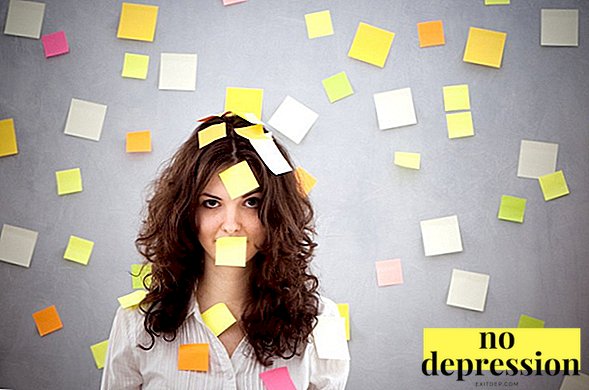Any change in the outer or inner world causes us emotions, and for many people they are often not only negative, but also too intense, which leads to feelings of anxiety and anxiety for any reason.
Why it happens? How not to be nervous for any reason - advice and recommendations of psychologists.
Psychology and causes

Anxiety without cause. Why am I nervous for no reason?
Why we tend to worry about any occasion?
There are both objective, common to all reasons, and the individual characteristics of each individual personality.
Where does the feeling of anxiety come from without a reason? Psychotherapist response:
Objective
Objective reasons:
- change the information environment. Despite the fact that scientific and technical progress greatly facilitates the life of a modern person, it also leads to information overload, since the rate of income and the amount of information processed by a person each decade roughly doubles. Naturally, this causes an overload of the psyche;
- high noise levels also have a negative effect on the psyche. And this concerns not only the urban environment - TV, radio, background music accompanies us almost the entire time of wakefulness, although a person needs several hours of silence every day;
- decrease in motor activity also leads to disruption of human biomechanisms, which is reflected in the work of the psyche.
Subjective

These reasons include individual characteristics each person.
Nervous tension is a defense mechanism whose task in antiquity was to constantly keep a person in good shape and to remain vigilant before the threat of a predator attack.
In the modern world predator image transformed into multiple nuances of the social sphere - these are requirements for compliance with the position held, often complex relationships with management, the threat to remain without work, fear of criticism or condemnation of people around them.
All this, adding up to a huge lump, makes us constantly feel pressure on the psyche.
Even if we are not worried about any particular important problem, we may be anxious and apprehensive. from the total value of all these requirements, which we must meet.
Unreasonable people with low self-esteem are especially susceptible to causeless anxiety, and with age, the tendency to negative perception of the world around us only grows.
How to stop worrying over trifles?

What if you are nervous on any occasion?
To reduce anxiety and not worry for no reason, try to approach your anxiety as follows:
- Imagine the most negative consequences. the situation that is currently bothering you. Is it scary? Mentally find for yourself a possible way out of this situation. At the same time, note that the overwhelming majority of negative expectations are not confirmed.
- Decide on your most important goals.. The prioritized will correctly align the importance of fears to the achievement of your main objectives.
- Try to give an impartial assessment of current events.. You should not strive to emotionally paint any situation.
- Try to get rid of guilt. It should be understood that the people around them perceive the protection of a person’s own benefit in a given situation in a completely normal way.
Also, give up unnecessary compassion - if you cannot help anyone with anything, this does not mean that you must be tormented by remorse.
How to stop being nervous for any reason? Psychological advice:
What to do?

How to stop worrying over trifles?
Not worth it either take responsibility for decisions or actions of others people - they themselves must make the right decisions.
Moreover, they have the right to freedom of action and do not try to take away this freedom from them.
- Try to discard your fears and concerns. - most of them simply do not come true. Try to come to a small compromise with yourself - for example, live two or three days without fear and fear. Perhaps you will like it, and you will not return to them at all.
- Do not obsessively scroll through a possible problem situation. in your mind many times in a row. Believe me, your unconscious and so doing it. Try to switch attention to current affairs - after all, a correct assessment of the situation at the present time will allow you to avoid problems in the future.
So focusing on the present is nothing more than a warning of your concern in the future.
- Avoid rushing. Haste in itself is a stressful situation in which any trifle will be an annoying element - a phone call, someone's insignificant request to be distracted, minor changes from planned activities.
 Try to properly allocate work and rest time. Do not mix everything into one big pile - during working hours you are obliged to do work - just as on vacation you should leave thoughts about work. Switching mental activity actually only increases your working capacity, so do not think that a professional problem that has been left unattended for some time loses the opportunity to be solved - on the contrary, your rest will only increase the chance to solve it.
Try to properly allocate work and rest time. Do not mix everything into one big pile - during working hours you are obliged to do work - just as on vacation you should leave thoughts about work. Switching mental activity actually only increases your working capacity, so do not think that a professional problem that has been left unattended for some time loses the opportunity to be solved - on the contrary, your rest will only increase the chance to solve it.- Leave the opinions of others with them. Do not allow it much influence on you. Remember that each person, if he negatively assesses you, pursues, first of all, his own goals and beliefs. And you have every right to your own.
- Try to reduce your expectations from the people around you. - inconsistency with your ideas only puts you off balance, but does not fix the current situation. Let others have their own flaws.
- Accept your own shortcomings. You should not be very upset about this - each of us is not without negative qualities.
Love yourself the way you are. Believe me - no one is perfect.
How to calm down and stop being nervous? Exercises:
Exercises

Very nervous about every occasion. How to learn to control yourself?
What kind exercises able to reduce anxiety levels? What can be done to ease fear or anxiety?
However, first of all - decide exactly which situations make you anxious - and if possible avoid them.
At the same time, you should not run away from reality - if the problem requires a mandatory solution, it is better to do it faster. But protect yourself from trifles that are irrelevant, but they can seriously spoil your mood, you can.
- Take a break from your fear. Try to do something else at times when you feel particularly strong anxiety. It is not necessary to do any serious or important work at the same time - on the contrary, do what you like, which soothes you and causes moral satisfaction. It can be reading your favorite book, watching a movie, a computer game - something that can allow you to temporarily turn your attention.
Try to leave your problem exactly as long as it takes to solve it.
- Do physical discharge. Expose yourself to physical exertion, which can cause you to be really tired - naturally, if it is not contraindicated to you by doctors. Such a step is a good stimulation of mental activity, because the body learns to overcome stressful situations and subsequently reacts better, adapts to external changes.
 Pay attention to water procedures. They can significantly improve your psycho-emotional state. This can be either a rubdown, a douche, or more extreme types - pouring icy water or swimming in a winter pond.
Pay attention to water procedures. They can significantly improve your psycho-emotional state. This can be either a rubdown, a douche, or more extreme types - pouring icy water or swimming in a winter pond.- Compare the situation with its worst possible option. Such a psychological technique can cause a more adequate assessment of your problem.
- Make an emotional discharge - it can be both tears and laughter. If required - cry. Or try to laugh at your own problem. Finding emotions will help you to restore mental balance.
- Keep a diary. Keeping a diary is nothing more than the verbalization of your problems. This way you will more clearly define your fears and fears.
Perhaps you will understand that some of them are so vague that you yourself cannot understand what you are afraid of.
- Find yourself an easy taskwhich is able to give you pleasure. Feel that you are able to keep a higher rhythm - it will bring you satisfaction from the fact that you are capable of more.
- A simple account in moments of emotional stress can also bring you back to balance. If you feel anxiety - count to twenty - this technique will make it easier to relive such moments.
 Please yourself with small gifts. Allow yourself a little whim in times of anxiety — for example, it may be a minor but enjoyable purchase. In fact, our consciousness will accept this as a small success that will help you regain control of the situation.
Please yourself with small gifts. Allow yourself a little whim in times of anxiety — for example, it may be a minor but enjoyable purchase. In fact, our consciousness will accept this as a small success that will help you regain control of the situation.
Remember - most of your worries are only in your consciousness and do not have a chance to translate into real life. Be open not only for anxiety, but also for positive emotions.
Is it harmful to be nervous? Find out from the video:

 Try to properly allocate work and rest time. Do not mix everything into one big pile - during working hours you are obliged to do work - just as on vacation you should leave thoughts about work. Switching mental activity actually only increases your working capacity, so do not think that a professional problem that has been left unattended for some time loses the opportunity to be solved - on the contrary, your rest will only increase the chance to solve it.
Try to properly allocate work and rest time. Do not mix everything into one big pile - during working hours you are obliged to do work - just as on vacation you should leave thoughts about work. Switching mental activity actually only increases your working capacity, so do not think that a professional problem that has been left unattended for some time loses the opportunity to be solved - on the contrary, your rest will only increase the chance to solve it. Pay attention to water procedures. They can significantly improve your psycho-emotional state. This can be either a rubdown, a douche, or more extreme types - pouring icy water or swimming in a winter pond.
Pay attention to water procedures. They can significantly improve your psycho-emotional state. This can be either a rubdown, a douche, or more extreme types - pouring icy water or swimming in a winter pond. Please yourself with small gifts. Allow yourself a little whim in times of anxiety — for example, it may be a minor but enjoyable purchase. In fact, our consciousness will accept this as a small success that will help you regain control of the situation.
Please yourself with small gifts. Allow yourself a little whim in times of anxiety — for example, it may be a minor but enjoyable purchase. In fact, our consciousness will accept this as a small success that will help you regain control of the situation.

